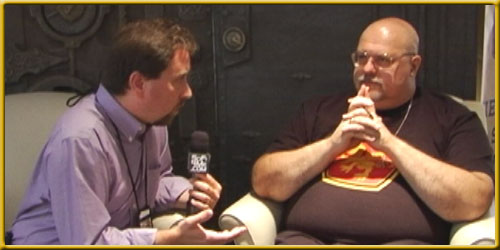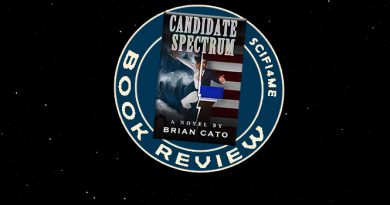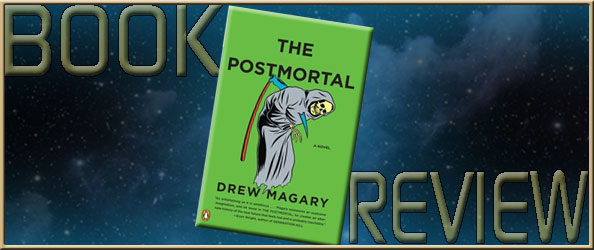DAVID WEBER: A Man Of Honor

Earlier this year, I got to sit down with author David Weber, the prolific scribe who has shared so many adventures with us. On this particular day, Mr. Weber was waiting to participate in a panel at Osfest 4.o, and he was experiencing a migraine headache, to boot. Needless to say, I was fully prepared to scrap the interview and let him rest, but he was gracious enough to persevere and let us have a chat.
What I anticipated being about a 15-minute interview ended up being a 45-minute conversation about lots of topics – the Honorverse, the Safehold books, politics and religion… and in my excitement at getting to talk with a favorite author, combined with my concern over his health, I had the wrong microphone selected and … well. We have a transcript of the interview, at least.
My thanks to David Weber for his time. Here’s Part I:
JPH: We are at Osfest 4.0 talking with David Weber, the Honor Harrington author, and you’re up to how many books now, in the Honorverse? About 20, between the novels, the young adults and the collections?
Let me think. I believe that we’re up to about 15 that are actually out now. We have the first Young Adult (book) coming out in October, so that will make 16 – we’re talking about novels. We have the next mainstream Honor novel coming out in March of next year. We have another one that’s already written and handed in but hasn’t been scheduled yet. And Eric Flint is working on his part in the next collaborative. So that should get us up to eighteen, nineteen novels. And we have had 5 volumes of short fiction, so you’re close.
JPH: My understanding – at one point, Honor Harrington was supposed to die, and she didn’t. Is that – I’m sure there are a number of factors that play into a decision like that. Was that more an editorial decision that was based on how the story was going, or the fans were just responding so well that you had to keep Honor alive?
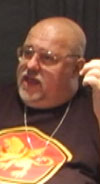 Well, it’s actually – I originally projected the series to go about eight books, and Honor was supposed to die about mid-point in the series, at which point we would find out about the real secret villains, etc. etc. that were running around. And there was supposed to be a twenty-year hiatus in the Honorverse time stream in which her children would grow up, graduate from the Academy, and deal with them.
Well, it’s actually – I originally projected the series to go about eight books, and Honor was supposed to die about mid-point in the series, at which point we would find out about the real secret villains, etc. etc. that were running around. And there was supposed to be a twenty-year hiatus in the Honorverse time stream in which her children would grow up, graduate from the Academy, and deal with them.
Obviously, my original estimate was a little off, since when I got to the point in the story arc where she was supposed to die, it was up to book fifteen. And in the meantime, Eric Flint had been doing some short fiction, and eventually has done two novels so far – collaborations in the Honorverse. And he asked me for something that a Manticoran and Havenite secret agent could both agree to hate. And so I gave him Manpower, Incorporated, the genetic slavers. And in playing with that plot line and with the information I was giving him from the tech bible and so forth, Eric pulled events forward, that I hadn’t planned on happening for a while. And I realized I didn’t have time for Honor’s children to grow up and deal with those plot strands. They would come to the surface sooner.
I won’t pretend I was heart-broken at the notion of NOT killing Honor Harrington off, for a lot of reasons. Obviously, potential fan reaction was one of them. If I was going to kill her off after four books, then people who had been following her for twenty years, wouldn’t have me killing their twenty-year favorite character off. But another factor, reason that I wasn’t exactly brokenhearted, was that I hadn’t realized how fond I was going to become of the character.
There are some drawbacks, though, because one of the reasons why she has attained the towering level of seniority that she has, is that I needed her to be the commander of the Manticoran Home Fleet in the climactic engagement that she was going to be killed in. And so now I’m stuck with somebody who is way, way too senior to send on death rides anymore, the way that in earlier books I could do. So that’s a definite drawback.
Another drawback is that I am still sort of playing catch up in some ways about how to deal with the compression of the novel time line. In the original to quote from Mentor of Arisia, my original “visualization of the cosmic all”, the bad guys would have been completely ready to strike when anybody found out about them, but there would have been a twenty-year period in which there would have been clues emerging into the open.
I had to completely revamp that on the run, so there’s a period in here where I’m trying to get my feet back under me and get back onto the original story arc plan. And it’s led to some unexpected twists and turns that I think, overall, have been beneficial but which definitely came as a surprise.
JPH: How much research – writing military fiction, how much research goes into one of your books? What’s in your background that gives you that perspective? Why choose military fiction as your major mode of choice in the books?
Well, I am, by academic training, a military and diplomatic historian. Politics obviously plays into that as well. People may notice that in my books. I don’t know. But it’s been an interest area of mine since roughly the fifth grade, which was some years ago. So I have a pretty good-sized database already tucked away in there, simply because this has been an area of study for me for that many years.
I do very little military research for any of the Honor Harrington books. I did a great deal of military research when I wrote Out of the Dark for Tor. But that is a very near future environment, and I’m using existing militaries in it, rather than my own creation.
The research that I do for much more for the Honorverse, to be honest, is in my own tech bible, going back and finding what I’d laid out originally. And the tech bible has been through several iterations by now, which can create a problem if you get it – which version are you looking at? It actually has bitten me a couple of times in the series. I would say that for a series writer like me, you do a lot more research and planning – if you organize it properly – you do a lot more research and planning if you organize the series in the first place, than you do on a per-book basis. Now, that’s my own technique. Other people may come at it very differently. But I wrote an 80,000-word tech bible on the Honorverse before I even started the first novel, so that I knew what the political structures were going to be, what the basic technological niches were going to be, what was going to be, the basic technological toolbox, where technology was going to evolve to. That sort of thing.
JPH: How much is modern-day politics playing a part in your plots? Are you looking at real-world events right now and trying to figure out how that can play into the circumstances in the Honorverse, or are you making it up based on how the plot needs to go and not drawing any comparisons from real-world circumstances?
It’s sort of an inextricable mix. The Honorverse is actually much more evolving in its own directions from the original template that I set up. There are some points where actual history has – they’ve swerved towards each other, but that was very seldom planned or intentional.
 When I created the Honorverse initially, I had a very specific template that I was creating, that was not the match for the exact historical groups that some people think it was. Where the Honorverse has gone in the meantime, has been following through the story arc, yes. But the institutions and the states have been evolving steadily because of where the story is going.
When I created the Honorverse initially, I had a very specific template that I was creating, that was not the match for the exact historical groups that some people think it was. Where the Honorverse has gone in the meantime, has been following through the story arc, yes. But the institutions and the states have been evolving steadily because of where the story is going.
In Flag in Exile, I did a scene in which a bunch of saboteurs caused a major building that was being constructed to collapse and kill 30 or 40 children. I had just turned the book in when the Oklahoma City bombing took place. And there is actually an author’s note in the book to that effect, that I had already written the scene before that whole thing happened.
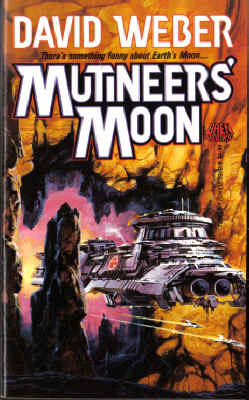 When I wrote Mutineer’s Moon, which was my first solo novel, if you go back and you look at it, I was already playing with Islamic terrorism and whatnot in that book then. So there are elements of obviously contemporary politics and history that creep in.
When I wrote Mutineer’s Moon, which was my first solo novel, if you go back and you look at it, I was already playing with Islamic terrorism and whatnot in that book then. So there are elements of obviously contemporary politics and history that creep in.
When Jim Baen asked me to pitch a potential series to him twenty years ago, Honor Harrington was one of ten that I suggested to him. I hadn’t realized that he’d been looking for somebody to do an interstellar Horatio Hornblower for twenty-five years. If I had I wouldn’t have bothered with the other nine.
However, one of the other nine was the series which is now turning into the Safehold books with Tor. The Safehold books have been much more directly influenced by contemporary events than they would have been in their original karma. They’re still the series that I was planning on writing, because it’s about freedom of conscience, and it’s about the role of religion – both positive and negative – and it’s about the nature of corruption that inevitably gathers around unchecked power in human institutions, that sort of thing. But the exact flavor of some of the action in it, has definitely been influenced – I can see it – by contemporary events. Most clearly, in many respects, in the book that is coming out in September, How Firm a Foundation, when we see the Inquisition resorting to tactics that are quite similar to some of the religious fundamentalists who are out doing all sorts of destruction right now.
I should point out that I’m a Methodist lay speaker, so my view on religion is not universally negative, by any means. I think anyone who’s ever read my work knows that. But I’m also a historian by training, and that means that you cannot help – if you’re going to be intellectually honest – being aware of the times when religion has been destructive as well as constructive. And at the moment, I that think we are witnessing one of the destructive aspects in the conflict that we’re seeing, specifically, Islamicist fundamentalists and the Western world.
And you’re also seeing the problem of the impossibility of compromise between people who hold extreme positions, and that is something that has inevitably crept into the Safehold books. I’m not trying to preach to anybody about how we’re supposed to deal with it or anything else, but a good story is about human. A good story is about human beings, and therefore you can’t avoid dealing with the same sort of things that are driving this conflict we’re seeing now on a real-life international scale.
[David Weber’s web site] [On to part 2]
![]()

